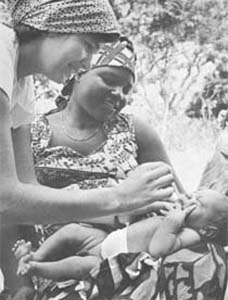
Jake Jones is stationed in the small village of Massali in Azerbaijan as a Peace Corps volunteer
Making an impact from Sheridan to Massali
Published: February 26, 2005
Jake Jones
By STARLA POINTER
Of the News-Register
It's a long way from Sheridan, Ore., to Massali, Azerbaijan. But Eddie Jones' thoughts often are in that small country on the Caspian Sea, which shares borders with Russia and Iran.
She thinks of her middle child, Jake, who is stationed in the small village of Massali as a Peace Corps volunteer.
Did his English lessons go well today? she wonders in the morning, when it's evening there, 12 hours ahead of Oregon time. Is he eating well, sleeping well, doing OK despite the awful pollution? Is he safe?
"Sometimes I worry, of course," his mom said.
She and her husband, Darrell, keep a world atlas handy so they can check out the places Jake mentions in his letters. Despite their concerns, they are glad their son is in the Peace Corps.
"It helps us to remember that he's doing exactly what he loves," she said.
Jake Jones, 27, graduated from Sheridan High School. His first assignment for the Peace Corps was in Uzbekistan.
He was stationed there for nine months prior to Sept. 11, 2001. But when terrorists attacked the United States, the Peace Corps pulled its volunteers to ensure their safety.
After four months, Jake returned to duty, this time in a remote village in Morocco. He was pulled out of Morocco a few months later when that country became too dangerous, his mother said.
"He's something of a celebrity in the Peace Corps because he's been evacuated twice because of terrorism," his mom said.
Jake started his third tour with the Peace Corps in September 2003, when he was sent to Azerbaijan. He learned the Azeri language, in addition to the French and Spanish he already knew. Now he is learning to read Arabic.
"Jake always wanted to learn as many languages as possible," his mom said.
After he finishes his work with the Peace Corps, Jake plans to continue his involvement with languages and international relations. He would like to earn a master's degree, then work overseas for a nonprofit aid agency.
These days, Jake keeps in touch regularly with his parents, sister Mia Hansen of Dundee and brother Eli, who teaches English in Japan.
He is able to send e-mails twice a week and make occasional phone calls. Azerbaijan is the first country where he's had cell phone access.
His letters talk about his work and experiences.
Jake teaches English to students in grades five through 12, most of them Muslim, in a small village. His school has about 650 students who come from surrounding areas.
"Being the first American many kids have met, I am enough of a novelty to hold their attention without any problems," he said.
Students find his American accent curious. In their previous experience with English speakers, they have encountered only British accents.
"I am often asked to de-emphasize my R's," he said. "Once, I even taught in a British accent because my kids were having trouble understanding."
English language
Parents are eager for their children to learn English. Students work hard, but have some difficulties understanding the differences between written and spoken forms of the language.
That's partly because their first language, Azeri, is pronounced just like it is written, with no silent letters.
"How do you read knife or telephone if you're learning the alphabet?" he explained. "If my students learn a word orally, they spell it wrong; if they learn it visually, they say it wrong."
Azeri, which is nearly identical to Turkish, has no irregular verbs either, he said. So his students tend to conjugate English verbs according to Azeri rules, and may thus say "bringed" or "taked" or "goed."
Jake has to watch his language, too. He has to speak formally.
"On average, a majority of my speech is idiomatic," he said. "I have to stop that in the classroom."
However, he is teaching his students some casual, common usages in English, such as "how come," "cool," and "kind of." He also uses old rock and roll songs and joke books to teach American phrases.
In addition to teaching English, Jake hosts a discussion group so people can practice. One week, the group discussed the differences in what boys and girls are allowed to do in the Muslim country.
Boys can do anything; girls cannot fish, visit a teahouse, eat out, play cards or drink.
They also talked about fate vs. free choice. Jake said he was surprised to learn his students thought most of what happens to them is the result of fate rather than their own doing.
"Few people wavered in their opinions," he said. "There seemed to be some set rules they followed and would not doubt."
When he was stationed in Uzbekistan, Jake worried about residents' vodka consumption. There's less drinking in Azerbaijan.
"It leads to much easier evenings," he said. "I don't mind going around being a guest as much when I know I won't have to refuse the bottle 500 times."
Fruit and vegetables
Azerbaijan is in a subtropical region, with very hot summers but cold and wet winters. Fruits like persimmons and quinces are plentiful most of the year, as are most vegetables.
But there are no greenhouses, so fresh produce is either unavailable or prohibitively expensive in cold months. In winter, his diet includes more rice, pasta and meat, such as duck, along with pickled tomatoes, eggplant, cabbage, peppers and cucumbers.
Even in the coldest months, though, meals always include fresh green onions, cilantro and parsley. "They eat a lot of greens, and I think that adds a lot to the meal," he said.
Jake devotes quite a bit of e-mail space to food. It's a topic through which it's easy to explain some of the cultural differences.
The main lunch or dinner dish is usually plov, a large pot of rice pilaf topped with garbanzo beans, raisins, meat and vegetables. Melted butter is poured on top as a condiment, he said.
Sometimes his host family serves dolma, a mixture of hamburger and rice rolled into small balls, wrapped in grape leaves or cabbage leaves, and boiled. For special times, meats are threaded onto long skewers for kebab. "Every type of meat imaginable is made into kebab, from mutton to sturgeon," he said.
Breakfast usually includes tea and whole grain bread and jelly. Sometimes, cheese, milk and butter are served.
"Tea is drunk in copious amounts," he said. Throughout the day, Azeris drink tea by holding a sugar cube between their teeth and letting the tea flow over it.
"I drink my tea without sugar," he said. "If I had that many sugar cubes sitting directly on my teeth, I would need all the gold teeth that they have here."
Having gold teeth is not considered a sign of bad dental health in Azerbaijan. In fact, Jake said, "It's very fashionable."
Dessert usually consists of fruit, either fresh or stewed.
Azeris often boil fruit in a large pot of water to make a compote. The liquid becomes a drink and the sweetened, boiled fruit is served as dessert.
"Since I eat a natural diet, have no fast food and don't snack, I probably eat much healthier here than I ever did in the states," he said.
"Unfortunately for my diet, Coke, Pringles and Snickers are all available in my village. And the capital even has two McDonald's!"
Primitive conditions
The capital, Baku, is very European. It is far more Westernized than Massali or other parts of Azerbaijan, he said.
Not only do about 3,000 Americans and Europeans live there, but "prices are much higher, salaries are much higher and technology is booming," he said. "I've seen several camera phones and even many Lexus SUVs."
Jake said jobs are scarce in the poor economy of rural Azerbaijan, so it's common for people from Massali to head to Moscow or other cities in Russia looking for work. They send money home via Western Union, he said.
When the father in his host family spent some time in Russia looking for work, Jake took on more responsibilities. One day, for instance, he was in charge of taking his young host brother to the dentist.
The dental office was primitive by American standards. The dental chair was set up in a hallway to take advantage of natural light.
Azeri dentists are capable of repairing cavities, but most people opt for less expensive extraction. And that was the case with his host brother.
The dentist administered a shot of novocaine, then grabbed the bad tooth with a pair of pliers and pulled it out. The bill ran the equivalent of 80 cents U.S.
"The lack of, well, everything shocked me quite a bit," Jake said.









